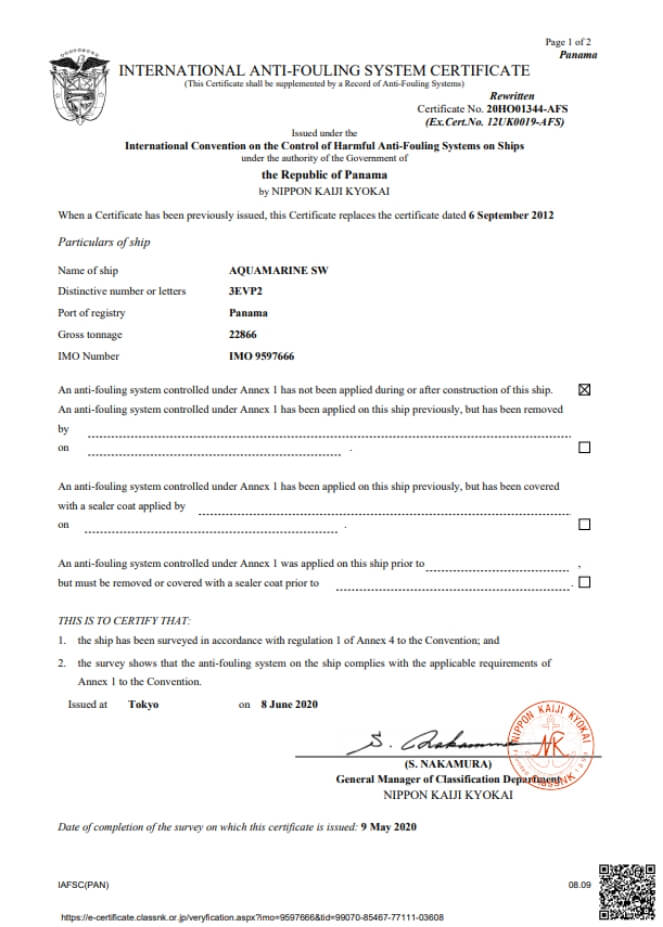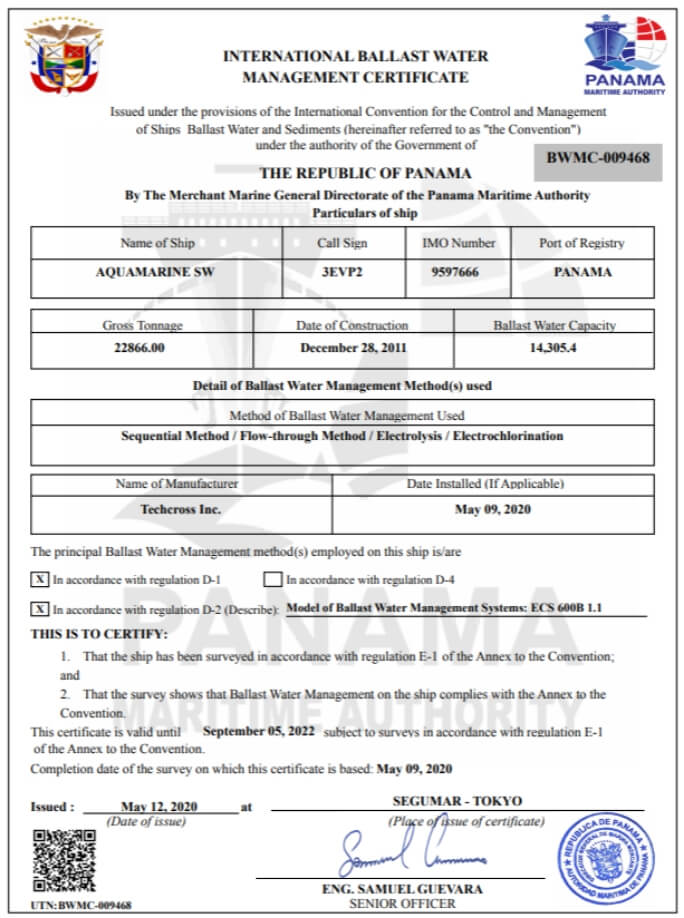Protection of Marine Ecology
The biodiversity of marine ecosystems underpins harmony between people and nature. With global trade expanding, over 80% of goods move by sea, ballast water and hull-fouling organisms an introduce non-native species into unfamiliar waters, threatening local ecosystems. Shih Wei is committed to international ocean-protection rules and to reducing the environmental footprint of marine transport. The Company’s HQ is not located in a protected area or other site of high biodiversity value.
Commitment to Comply with International Regulations or Conventions for the Protection of Marine Environment
In 2024, the salling-time of the Company's fleet in Marine Protected Areas or Protected Areas totled 519.8775days.
Because ocean transport relies on ballast water for vessel stability, transoceanic voyages risk transferring pathogens or non-native organisms via ballast discharge or hull fouling. Shih Wei’s fleet complies with IMO Ballast Water Management requirements and MARPOL, effectively managing ballast water and fulfilling responsibilities for marine environmental protection.
Shipping activities can also affect terrestrial ecosystems. In February 2024, the US Department of Argriculture (USDA) and Canadian Food Inspection Agency (CFIA) issued the annual Flighted Spongy Moth Complex (FSMC; formerly Asian Gypsy Moth) risk-period guidance for Far East ports.
Vessels calling in risk areas must:
- Undergo inspection and obtain FSMC-free certification to avoid delays or positive findings on arrival.
- Conduct comprehensive self-inspections before arriving in North America; vessels may be ordered to divert or clean if contamination is found.
- Submit the previous two years of port-call history 96 hours prior to arrival.
If introduced into non-native regions, these moths can defoliate and weaken trees; two consecutive years of severe infestation may cause extensive forest and orchard mortality, posing serious threats to agriculture and the environment.
Since 2023, Shih Wei has applied silicone-based antifouling coatings on hull whose low-friction surfaces reduce fuel consumption and contain lower biocide levels, more ocean-friendly. Two additional vessels adopted this coating in 2024, advancing the Company’s marine protection goals.
In 2024, the number of times and volume of harmful substances leakage from the Company’s fleet was 0
Shih Wei Navigation operates in compliance with the following international laws and regulations, and is committed to the maintenance of ocean sustainability to do our part for the earth.
International Acts on Marine Environment Protection
- International Convention for the Prevention of Pollution from Ships, MARPOL
- International Convention for the Control and Management of Ships Ballast Water and Sediments, Ballast Water Management Convention
- International Convention on the Control of Harmful Anti-fouling Systems on Ships
- International Safety Management Code, ISM Code
Local Regulations of Ports of Call in Different Countries
- IMO SOx Emission Control Areas
- US Vessel General Permit, VGP
- Marine Invasive Species Program, MISP
- EU Regulation No. 2015/757 on the Monitoring, Reporting and Verification of carbon dioxide emissions from maritime transport, EU-MRV
The International Maritime Organization's Subordinate Committees and their latest marine environmental protection regulations updates (2024)
- Arctic ports may join regional arrangements for Port Reception Facilities (PRF) (oil, noxious liquid substances, sewage, garbage, and air emissions). Effective on 1 May 2024.
- Garbage Record Book scope expanded to ships of ≥ 100 GT (previously ≥ 400 GT). Effective on 1 May 2024.
- The Mediterranean Sea has been designated a Sulphur Oxides Emission Control Area (SOx
ECA)—covering SOx and particulate matter (PM). effective on 1 May 2024.
Ballast Water Management
Shih Wei complies with the International Convention for the Control and Management of Ships’ Ballast Water and Sediments (BWMC, 2004). With the exception of the passenger ship (exempt due to its characteristics), all vessels implement ballast water management and hold flag-state certificates.
Key performance (excluding passenger ships)
Percentage of ships that have implemented ballast water exchange:
41%
Percentage of ships that have implemented ballast water treatment:
: 100%
Ballast water is pumped into ballast tanks from the sea to add weight when the ship unloads its cargo and pumped out when it is taking on cargo to balance the weight of the ship during a voyage. However, during transoceanic transportation and the ballast water discharge process, the water source containing viruses, bacteria, and non-indigenous species enters the waters of different countries through ballast water or ship hulls. Once invasive species spread, they are often difficult and costly to eradicate. Moreover, they may establish large breeding populations in new environments, posing threats to the survival environment of native species and impacting coastal ecosystems and industries worldwide.
To avoid the different degrees of environmental pollution and ecological impact in the ports of different countries caused by the propagation of alien species brought by the ship when the ballast water is exchanged or discharged in different waters, Shih Wei Navigation has formulated standard ballast water management methods in accordance with ballast water related regulations stipulated by IMO and MARPOL, and relevant certificate was also obtained to fulfill our corporate social responsibility and protect the marine environment.
IAFS certificate: Shih Wei Navigation’s fleet obtained the International Anti-fouling System (IAFS) Certificate issued by Classification Societies
Shih Wei Navigation entrusted the ClassNK based in Japan and Bureau Veritas based in France to test the types and compositions of ships in accordance with the International Convention on the Control of Harmful Anti-fouling Systems on Ships, 2001. It was confirmed that the ships are free of organic tin compounds, and the LAFS Certificate was obtained.
BWMC: Shih Wei Navigation’s fleet obtained the International Ballast Water Management Certificate (BWMC) issued by Flag State
According to the requirements stipulated in the International Convention for the Control and Management of Ships' Ballast Water and Sediments, ships must have the ballast water management plans, certificates, and record books. The vessels of our fleet have successively installed the ballast water treatment equipment and obtained authorization so as to work in line with the ballast water declaration and discharge regulations across the world to jointly maintain the marine ecology and environment.

IAFS Certificate

BWM Certificate


